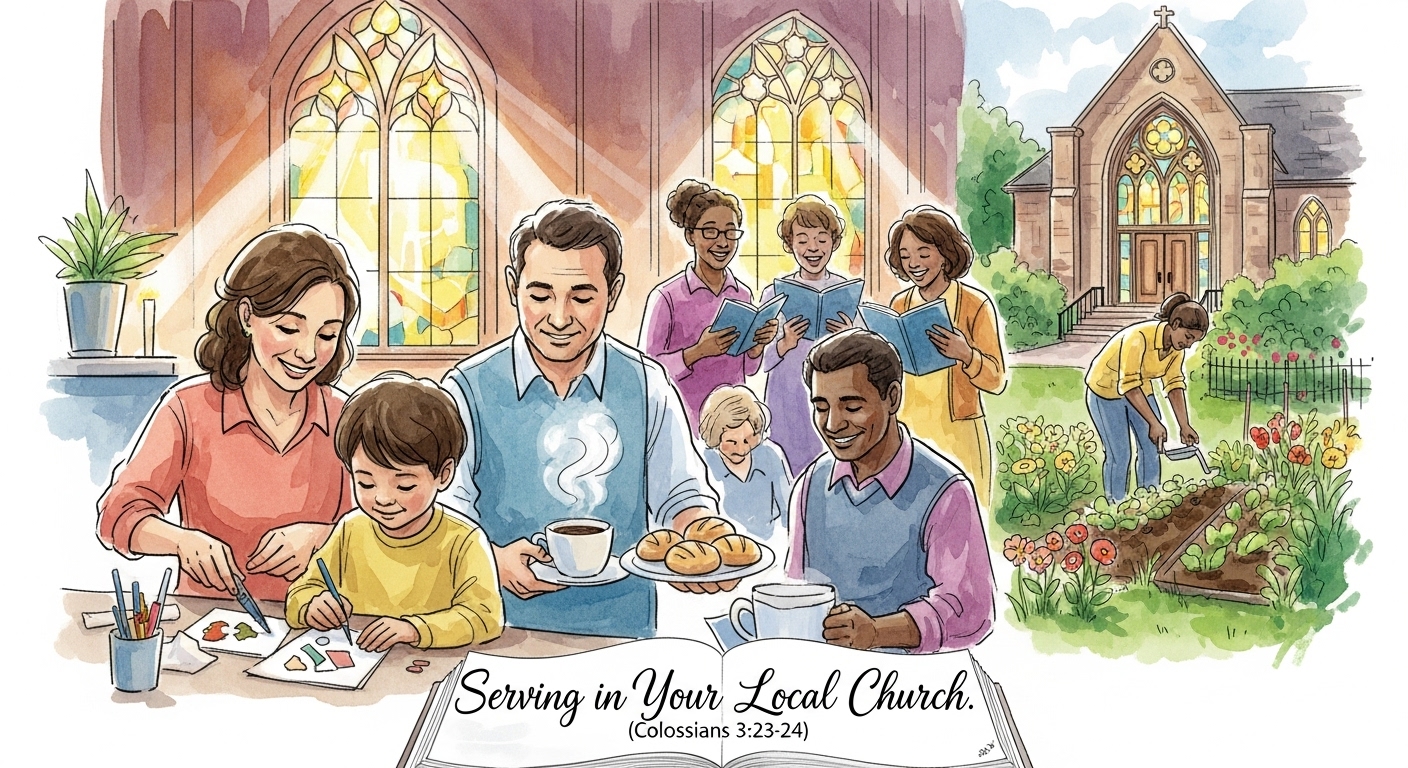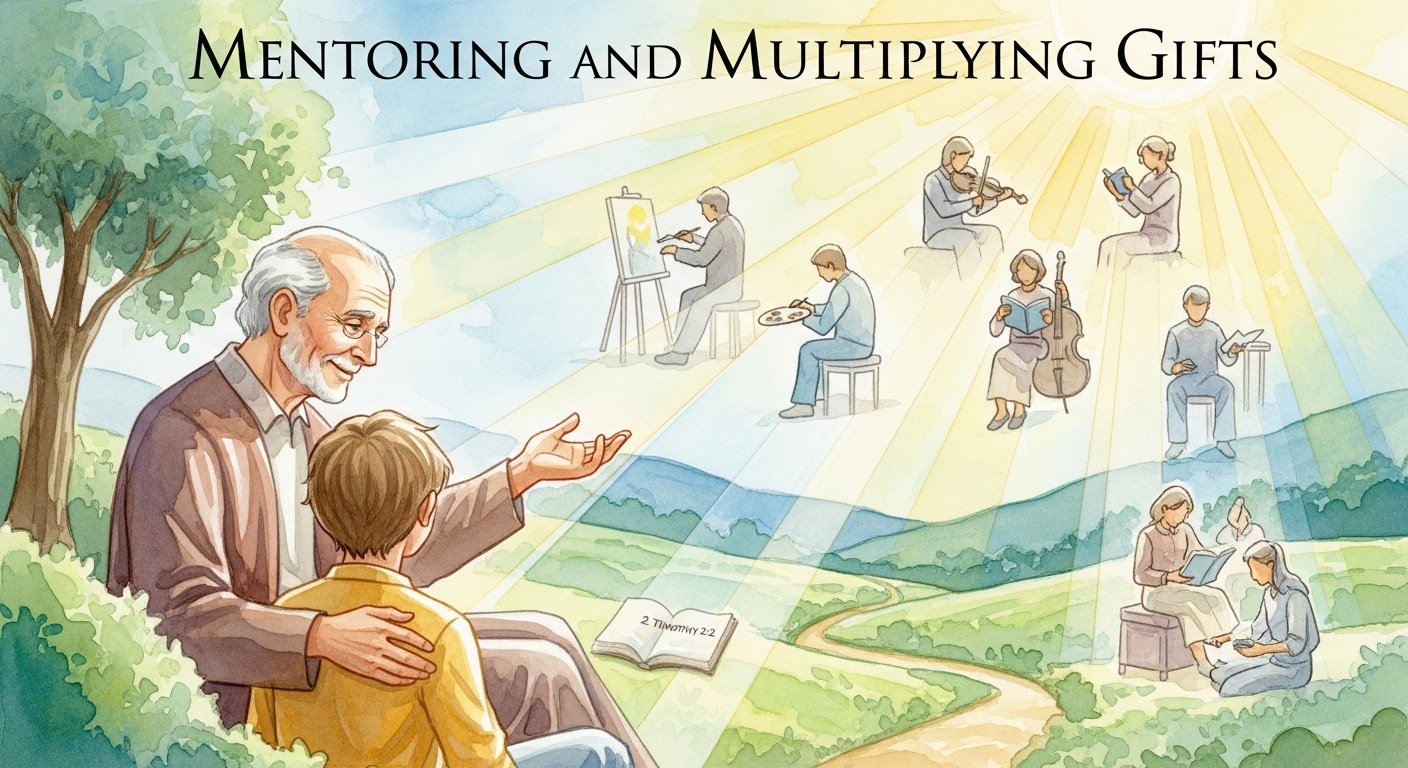Stewarding Your Gifts For God’s Glory
You’ve probably heard the phrase “gifts from God” before, but stewarding those gifts for God’s glory goes beyond casual gratitude. Stewardship is an active, ongoing commitment to manage well what God has entrusted to you—your talents, time, influence, resources, and purpose. When you focus on using your gifts for God, you shift from simply possessing abilities to intentionally deploying them for a higher cause. This article is for you if you want to understand how to steward your gifts faithfully, practically, and joyfully, with biblical anchors and real-world applications to help you live out your calling.
Why Stewardship Matters
Stewardship matters because God entrusts you with something valuable and expects faithfulness in return. You aren’t the owner of your gifts in the absolute sense; you are a steward charged with nurturing and deploying them for God’s purposes. The Bible reminds you that every good gift is from above and that your gifts are meant to serve others and glorify God. For example, the apostle Peter writes that you should use whatever gift you have received to serve others, as faithful stewards of God’s grace in its various forms (1 Peter 4:10).

When you embrace stewardship, you participate in God’s kingdom work rather than merely advancing personal ambitions.
Understanding Gifts vs Skills
It helps to distinguish between gifts and skills so you can steward both with clarity. Gifts often describe spiritual endowments given by the Holy Spirit—abilities that build up the church and point people toward God—while skills are talents you’ve developed through practice, education, or natural aptitude. Both matter: God can use innate abilities, learned expertise, and spiritual gifts together. Scripture acknowledges a variety of roles and gifts among believers, encouraging you to exercise what you have according to the grace given to you (Romans 12:6-8). Recognizing this difference helps you value development without losing sight of divine empowerment.
Recognizing Your Unique Design
You’re uniquely designed by God, and your gift mix is part of that design. The New Testament teaches that there are different kinds of gifts, yet the same Spirit distributes them, and each serves the common good (1 Corinthians 12:4-7). When you begin to see your gifts as part of a broader body with complementary roles, you gain perspective. You’ll likely find that what you consider small or ordinary can be precisely what another person or the community desperately needs. Recognizing your unique design helps you move with confidence toward opportunities where your gifts can flourish.
The Biblical Model of Stewardship
The Bible gives you clear images of stewardship, none more poignant than the parable of the talents. In that parable, servants are entrusted with resources and judged on how they used them—whether they invested, multiplied, or buried them out of fear (Matthew 25:14-30). The core lesson for you is simple: God expects fruitfulness. Stewardship is not passive preservation; it’s active investment. Your gifts are meant to be used, cultivated, and multiplied for God’s purposes and glory.
Responsibilities of a Faithful Steward
Being a faithful steward carries responsibilities that touch every area of life: accountability before God, wise use of time and resources, cultivating your gifts, and a willingness to release control for the sake of service. Scripture notes that to whom much is given, much will be required, and emphasizes that faithfulness in little tasks translates into greater trust (Luke 12:48). When you understand your role as a steward, you’ll prioritize growth, accountability, and the intentional allocation of your abilities where they can serve others best.
Spiritual Fruit and Gifts
Gifts and fruit go hand in hand. While spiritual gifts equip you for ministry, spiritual fruit—qualities like love, patience, kindness—frames how you use those gifts. The fruit of the Spirit provides the character context that makes your gifts effective and Christlike (Galatians 5:22-23). You can possess an impressive gift but without love, it becomes empty. Stewardship, therefore, includes cultivating Christlike character so the exercise of your gifts honors God and draws people to Him.
Practical Ways to Use Your Gifts for God
Putting theory into action is where transformation happens. You can start stewarding your gifts today by taking intentional, practical steps—discovering your strengths, seeking opportunities in church and community, integrating faith into your workplace, mentoring others, and being willing to serve in small, faithful ways. The keyword here is consistent: when you think in terms of using your gifts for God daily, your decisions begin to line up with Kingdom priorities, and opportunities to make an impact emerge naturally.
Serving in Your Local Church
Your local church is often the primary place to develop and exercise your gifts. It’s a laboratory for growth and a community that needs a wide range of skills. Colossians reminds you to work heartily, as for the Lord rather than for people, because you ultimately serve Christ when serving others (Colossians 3:23-24).

When you use your gifts for God within the church, you contribute to a shared mission, help build unity, and find encouragement and accountability from fellow believers.
Serving Beyond the Church
Using your gifts for God doesn’t stop at the church door; it extends into your workplace, neighborhood, and online presence. You’re called to be salt and light where you live and work, making everyday spaces arenas for faithful witness and service. When you live out your gifts in secular contexts, you demonstrate Christ’s love in practical ways, inspiring curiosity and trust in those who may never step into a church. The way you use your gifts for God in your profession, in volunteering, or in civic engagement can draw others toward Christ by showing the gospel in action.
Using Gifts in Seasons of Waiting or Suffering
There will be seasons when it feels like your gifts are dormant—times of waiting, loss, or suffering. These seasons are not wasted; they can be formative. Scripture reminds you that God works in all things for the good of those who love Him, shaping endurance and character in you (Romans 8:28). During hardship, stewarding your gifts may mean small acts of faithfulness: praying, learning, reaching out to others, or offering the gift of presence. You might discover deeper empathy or new capacities that make your future service more compassionate and effective.
Obstacles to Stewardship and How to Overcome Them
Several obstacles can keep you from effectively stewarding your gifts: fear of failure, comparison with others, busyness, perfectionism, or a lack of clarity. Recognizing these roadblocks is the first step to overcoming them. The Bible encourages you not to be timid but to rely on God’s Spirit, which gives power, love, and self-discipline—qualities that counter fear and paralysis (2 Timothy 1:7). Practical disciplines—prayer, honest self-assessment, mentorship, and setting realistic goals—help you move forward despite obstacles.
Dealing with Fear and Doubt
Fear and doubt can paralyze your willingness to step out. You might ask, “What if I fail?” or “Who am I to serve in that way?” Biblical truth addresses this: God equips the called and promises His presence. Remember that even Christ’s followers wrestled with doubt, yet many moved forward in faith and saw God use their imperfect obedience. Wrestle honestly with fear, bring it to God in prayer, and take small, courageous steps toward serving. Often, consistent faithfulness, not leaps, produces the greatest growth.
Avoiding Comparison and Envy
It’s tempting to measure your gifts against others, especially in environments that highlight achievement and visibility. Comparison steals joy and distorts your sense of purpose. Scripture encourages individual faithfulness rather than envy, urging you to test your own actions and take pride in your progress rather than resenting someone else’s gift (Galatians 6:4). When you focus on using your gifts for God rather than on how you stack up, you’ll find a healthier, more sustainable motivation for service.
Developing a Stewardship Plan
A stewardship plan gives structure to your intentions. It will vary based on your season of life and the gifts you’ve been given, but a simple framework can keep you accountable and focused. Consider steps like: (1) pray and ask God for clarity, (2) identify strengths and opportunities for service, (3) set short and long-term goals, (4) seek training or mentorship, and (5) evaluate and adjust regularly. A plan doesn’t have to be complicated—just directional. When you commit to using your gifts for God with intentionality, progress happens naturally.
Setting Spiritual Goals
Setting goals helps you translate desire into action. Spiritual goals might include regular times of intentional service, a commitment to learning (through books, classes, or mentorship), or a plan to use a specific gift in a ministry context. Proverbs encourages you to commit your plans to the Lord and trust Him to establish your steps (Proverbs 16:3). Goal-setting grounded in prayer keeps you from drifting and makes your stewardship measurable and accountable.
Accountability and Community
You weren’t meant to steward alone. Community provides encouragement, correction, and the accountability that fosters growth. The New Testament emphasizes spurring one another on toward love and good deeds and not neglecting to meet together (Hebrews 10:24-25). When you share your stewardship goals with trusted friends, mentors, or leaders, you gain perspectives that sharpen your discernment and motivate consistent progress. Accountability helps you avoid isolation and enhances the fruitfulness of your efforts.
Teaching the Next Generation to Steward Gifts
If you’re part of a family or community with younger people, you have a responsibility to model and teach stewardship. Passing on the values of generous service, spiritual disciplines, and honest work prepares the next generation to use their gifts for God. Moses and the ancient teachers commanded repeated instruction to children, weaving faith into daily life and conversation (Deuteronomy 6:6-7).

Teaching can be formal or informal—serve together, discuss calling at the dinner table, and celebrate every example of faithful use of gifts.
Stories of Ordinary People Stewarding Gifts
Real-life stories can inspire your own steps. Consider the neighbor who uses a retired teacher’s skill to tutor kids after school, the chef who opens a shelter kitchen and uses culinary gifts to provide dignity and nourishment, or the businessperson who pursues ethical practices and mentors apprentices. These are ordinary people making kingdom impact by using what they have for God. Such stories remind you that stewardship isn’t reserved for professionals or celebrities; it’s the day-to-day faithfulness of ordinary people that often bears the most fruit.
The Eternal Perspective
When you steward your gifts for God, you’re investing in things that last beyond this life. The apostle Paul teaches that your work done in the Lord has eternal value, because you ultimately serve Christ and will receive a reward for faithful service (Colossians 3:23-24). This perspective reshapes how you view sacrifice, time, and success. Short-term discomfort might be endured for the sake of long-term fruit. Remembering the eternal perspective helps you keep priorities straight when immediate results are lacking.
When You Fail: Grace and Restoration
Failure is part of the journey. You’ll make mistakes, misuse opportunities, or hesitate when courage was needed. But failure does not disqualify you from God’s call. Scripture offers grace and restoration—confession leads to cleansing, and God’s mercy renews purpose (1 John 1:9). When you fall short, return to God, accept His forgiveness, learn from missteps, and re-engage with humility. Restoration often strengthens your stewardship because it compels dependence on God rather than self-reliance.
Integrating Gifts into Everyday Rhythms
To make stewardship sustainable, integrate your gifts into daily life. That might mean setting aside time to practice, blocking calendar slots for service, turning mealtimes into mentoring opportunities, or carving out sabbath rest to renew creativity and prevent burnout. The rhythm of faith—work, rest, prayer, community—keeps your gifts healthy and your heart aligned with God’s purposes. When your stewardship is woven into ordinary rhythms, it becomes less of an extra obligation and more a natural expression of living for God.
Simple Habits That Multiply Impact
Small, consistent habits often produce the biggest results. Habits like weekly reflection, regular learning, serving one person consistently, or inviting feedback create a sustainable platform for growth. Jesus taught the value of small seeds that grow into large plants; your consistent small actions, when dedicated to God, can lead to disproportionate impact. Habits guard against drift and help you stay focused on using your gifts for God in both mundane and extraordinary moments.
Assessing and Recalibrating Your Use of Gifts
Every so often, take stock. Are your gifts producing fruit? Are you growing in character? Is your service aligned with God’s leading? An honest assessment will reveal where recalibration is needed. Just as you might refine a musical skill or adjust a ministry strategy, stewarding gifts requires periodic tuning. Ask trusted peers to help evaluate, and remain open to shifting directions as God leads. Recalibrating is not failure; it’s faithful stewardship responding to seasons and new insights.
Mentoring and Multiplying Gifts
One of the most powerful ways to steward your gifts is to multiply them through mentoring. When you invest in someone else—teaching, coaching, encouraging—you extend the reach of your gift beyond what you could do alone. The apostle Paul mentored Timothy and others, demonstrating the multiplying effect of teaching and example (2 Timothy 2:2).

Mentoring requires humility and time, but it creates a legacy of faithful service and equips the next wave of leaders to use their gifts for God.
The Role of Prayer in Stewardship
You can’t steward well without prayer. Prayer aligns your heart with God’s purposes, invites the Spirit’s empowerment, and cultivates sensitivity to how and where to use your gifts. Jesus modeled prayer as the foundation for ministry decisions and dependence on the Father. When you practice consistent prayer around your gifts—asking for discernment, boldness, and opportunities—you invite God to shape both your motives and your outcomes. Prayer keeps you connected to the Source of all gifts.
Using Your Gifts for God in a Digital Age
The digital world expands opportunities—and ethical questions—related to stewardship. Online platforms allow you to teach, encourage, create art, and mobilize resources on a scale previous generations couldn’t imagine. Stewarding digital influence means being truthful, honoring God in your content, protecting vulnerable people, and using technology to foster genuine community. The principles don’t change: use what you have for God, serve others, and pursue excellence and integrity in how you represent Christ online.
Practical Examples and Next Steps
If you’re wondering what to do next, start with clear, practical steps: identify one gift to develop this month, volunteer for a specific role at church, offer mentorship to someone younger, or use your expertise in a pro bono project. Invite feedback, set a small measurable goal, and commit to a rhythm of prayer and accountability. These actions, repeated over time, will deepen your stewardship and expand your impact. Remember: the goal is not simply activity but faithful, Christ-centered use of what God has given you.
Conclusion: Your Call to Faithful Stewardship
You are invited into a lifelong journey of stewardship—a journey that calls you to recognize your gifts as entrusted by God, to cultivate them with humility and discipline, and to use them to glorify Him and serve others. Using your gifts for God shifts your priorities from self-promotion to Kingdom-building and from short-term gain to eternal investment. Start where you are, be faithful in small things, seek community, and stay rooted in prayer. Your faithful stewardship matters more than you might imagine.
Explore More
For further reading and encouragement, check out these posts:
👉 7 Bible Verses About Faith in Hard Times
👉 Job’s Faith: What We Can Learn From His Trials
👉 How To Trust God When Everything Falls Apart
👉 Why God Allows Suffering – A Biblical Perspective
👉 Faith Over Fear: How To Stand Strong In Uncertain Seasons
👉 How To Encourage Someone Struggling With Their Faith
👉 5 Prayers for Strength When You’re Feeling Weak

📘 Jesus and the Woman Caught in Adultery – Grace and Mercy Over Judgement
A powerful retelling of John 8:1-11. This book brings to life the depth of forgiveness, mercy, and God’s unwavering love.
👉 Check it now on Amazon 🛒💥
🔥 “Every great message deserves a home online.” 🌍💬🏡
Don’t let your calling stay hidden. Start a Christian blog or website using Hostinger — with 99.9% uptime, a free domain, and SSL, your voice can shine for God’s glory anytime, anywhere.
💥 Begin today. 🛒 Try it RISK-FREE! ✅
✝️ “Your body is God’s temple — care for it with purpose.” 💪💖🏛️
Renew your energy and restore balance naturally. Mitolyn helps support a healthy metabolism, giving you the vitality to live out God’s calling with strength and confidence.
🔥 Unlock Your Metabolic Power! ⚡Burn More Calories & Feel Great With Mitolyn. 💪
👉 Start Today. 🚀 Check Price Now. 🛒💰
💰 As a ClickBank & Amazon Affiliate, I earn from qualifying purchases.
📖 Acknowledgment: All Bible verses referenced in this article were accessed via Bible Gateway (or Bible Hub).
🚀 Want to explore more? 👉 Dive into our new post on Why Jesus? and experience the 🔥 life-changing truth of the Gospel!




